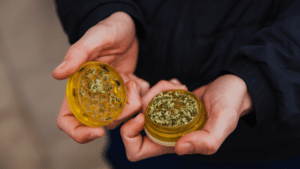
How to Shop for Cannabis this Holiday Season
How to Shop for Cannabis this Holiday Season Looking for the perfect gift for the holidays? A recent poll shows that 9 out of 10 cannabis consumers in states

How to Shop for Cannabis this Holiday Season Looking for the perfect gift for the holidays? A recent poll shows that 9 out of 10 cannabis consumers in states

Post-Traumatic Stress Disorder (PTSD) is defined by the PTSD Foundation of America as a psychiatric disorder that can occur following the experience or witnessing of life-threatening event such as military

Cannabis is considered to be one of the earliest plants used for medicinal purposes by humans. It is also widely known for non-medical uses as well. Given increased access as

Cannabidiol (CBD) and delta-9-tetrahydrocannabinol (THC) are the two major cannabinoids found in the Cannabis Sativa plant. In recent years, CBD has been more widely discussed as preclinical and clinical studies

Updated September 2025 Breast cancer is the most common cancer in women worldwide. Despite advances in early detection, it remains the second leading cause of cancer death in American

Though more individuals are turning to cannabis to treat a variety of ailments, this medicinal plant still carries an undeserved stigma, largely in part due to misinformation online and in

In July of this year, Headcount released a report that looked in depth at the turnover rate of cannabis retail associates, otherwise known as “budtenders”. It was found that 55%

Cannabis hangovers, also referred to as “weed hangovers,” refer to the range of effects that may take place the day after consuming cannabis products. These unpleasant sensations, which range from

This November, several individuals in the United States will have the opportunity to change cannabis laws. Currently, four states have secured the necessary number of signatures to place their measures

Sleep disorders affect up to 70 million Americans each year. Causes may vary from person to person, but can include life stressors, unhealthy lifestyles, depression, chronic pain, and neurological disorders
Open the following in new tabs if you:
If you are already a user: Client Login
If you are not, then register: Client Registration
Once Logged in, click below to refresh the page.